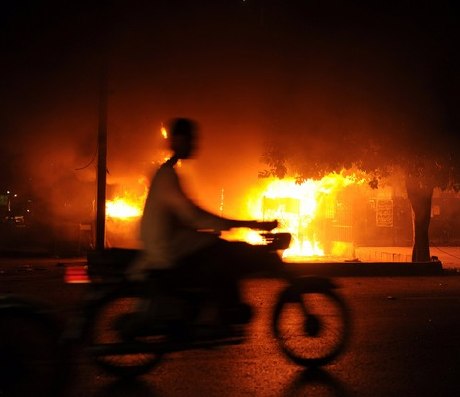Meray Shehr jal rahey haiN, Meray Loug mar rahey haiN

Karachi burns again. Tears swell up, but words run dry. This poem by Obaidullah Aleem, written in 1971 and sent to me recently by Naveed Riaz, says what we all feel. (
Meray Shehr jal rahey haiN, Meray Loug mar rahey haiN
(My cities are burning, by people are dying).
But it is really the last line of the ghazal that speaks to our collective angst, and indeed our collective guilt:
Hum he Qatl ho rahey haiN, hum he Qatl kar rahey haiN
(We ourselves are doing the dying, we ourselves are doing the killing).
How deep. How true. How sad.
The same thoughts are conveyed also in this poem by Ahmad Faraz; written in response to an earlier spate of killings in Karachi. We have used Faraz’s words before on this blog, including in a January 2008 post which is worth revisiting because all we said then could be said again today. But what deserves to be said again most of all are the words from Ahmed Faraz… Here I repeat them along with my commentary on them from 2008:
A few lines from the poem worth thinking about as we grieve, yet again, the loss of innocent lives at the hands of those who wish to prove the ‘righteousness’ of their cause by violence, murder and mayhem.
On how none of this is new and how the result is always a heightening of ethnic, sectarian and other ‘differences’. Note the “phir say tou kouN hai, meiN kouN houN, aapas meiN sawal” [once again, we ask each other: who are you? who am I?]
phir wohe aag dar aaye hai mairi galiyoun mein
phir mairey shehr mein barood ki boo phaili hai
phir say tou kouN hai, meiN kouN houN, aapas meiN sawal
phir wohi soch miyan-i-mann-o-tou phaili haiOn how we are sp quick to blame ‘outsiders’ for our misery, as if we had no hand in it ourselves. Note the “mairey seenay meiN sadda apna he khanjar utra” [it has always been my own dagger that has pierced my heart]
mairi basti say parrey bhi mairey dushman houN gay
par yahaN kabb koee aghyaar ka lashkar uttra
aashna haath he aksar mairey janab labkay
mairey seenay meiN sadda apna he khanjar utraThis part is my favorite. About how fear (khouf) and uncertainty (tazabzub) rules, and how much havoc is brought forth by those who use the rhetoric of patriotism (naara-i-hubb-i-watan) and of religion. Note the “naara-i-hubb-i-watan maal-i-tajarat ki tarhaaN” [slogans of patriotism are traded like commodity in a bazaar] and the “jinss-i-arzaaN ki tarhaaN deen-i-khuda ki baateiN” [talk of religion has become like a commodity in over-supply].
phir wohi khauf ki deewar, tazabzub ki faza
phir hoeeN aam wohoee ahl-i-riya ki baateiN
naara-i-hubb-i-watan maal-i-tajarat ki tarhaaN
jinss-i-arzaaN ki tarhaaN deen-i-khuda ki baateiNAnd he ends with these words of hope that give me great solace. When he talks about “mairey dilgeer, mairey dard kay maarey logou” he seems to be talking to us directly today. But the real kicker is in the last two lines: “kissi ghasib, kissi zalim, kissi qatil kay leeaye, khod ko taqseem na karna, mairey saarey logou” [do not, O please do not, let the usurpers, the tyrants, the murders divide you into factions].
aaj aisa nahiN, aisa nahiN honay daina
aye mairey sokhta jaano, mairey piyarey logou
abb kay gar zalzalay aaye tou qiyamat ho ge
mairey dilgeer, mairey dard kay maarey logou
kissi ghasib, kissi zalim, kissi qatil kay leeaye
khod ko taqseem na karna, mairey saarey logou
View a video of Ahmad Faraz reciting this poem.

 Governmetn websites:
Governmetn websites:









 Election Commission
of
Pakistan
Election Commission
of
Pakistan 







 English Newspapers
English Newspapers
















 Dars-e-Quraan
Dars-e-Quraan Dr. Israr Ahmad
Dr. Israr Ahmad 
0 comments:
Post a Comment